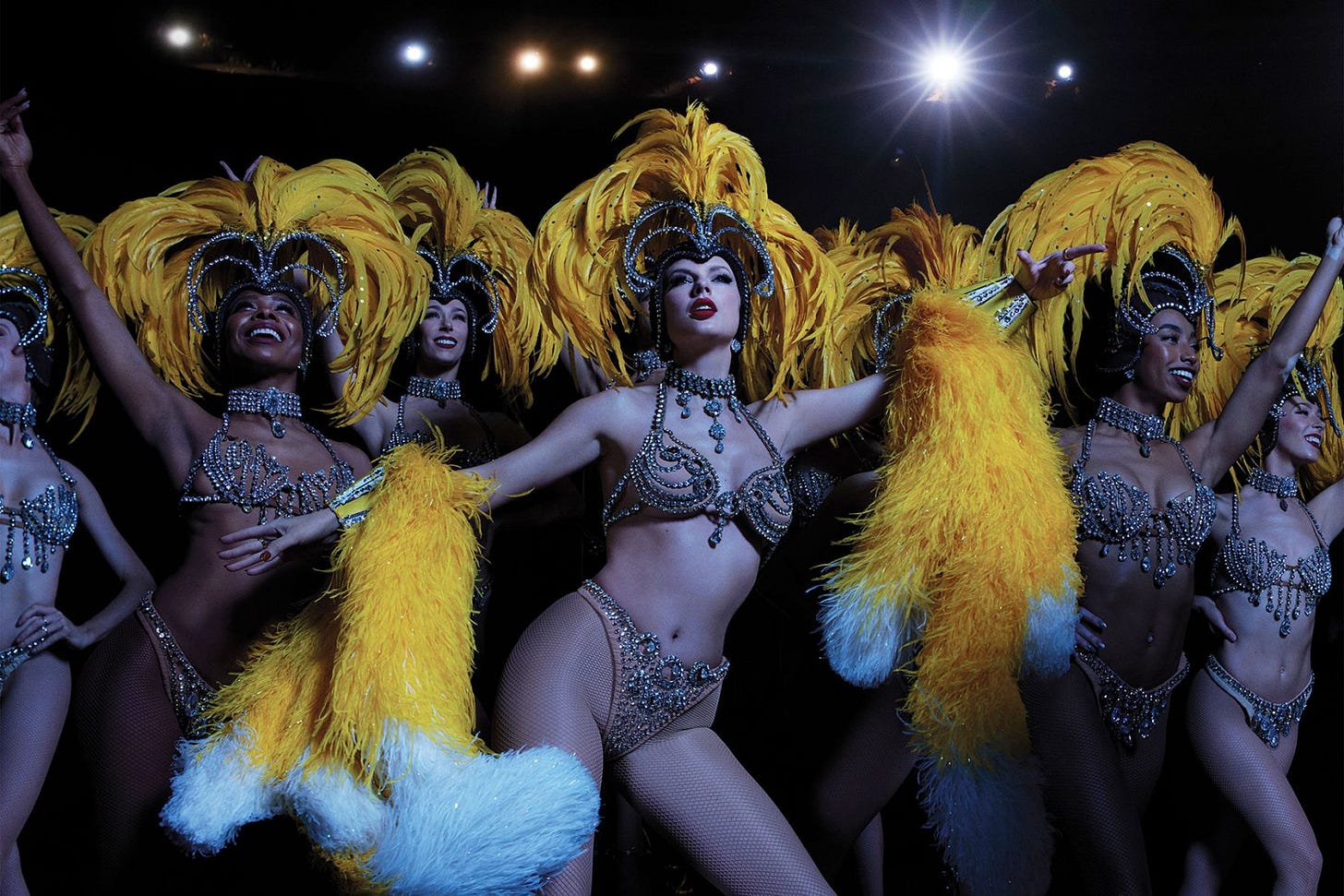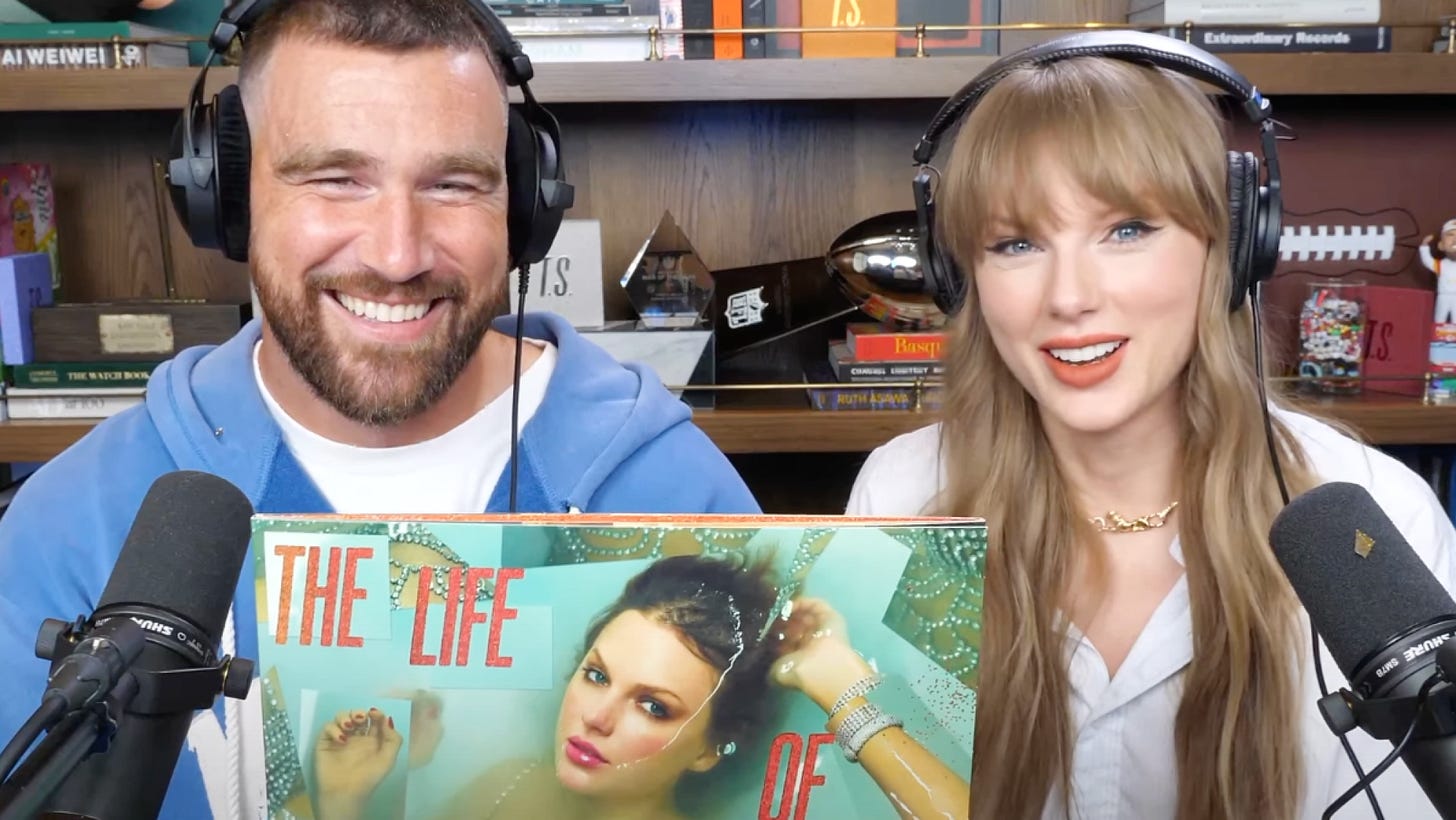Instead of a new Swiftian era, The Life of a Showgirl feels like Taylor rifling through the pop culture lost and found. Miley Cyrus already did the showgirl thing on Something Beautiful and Gia Coppola’s The Last Showgirl just gave Pamela Anderson her art-film comeback moment. Even Addison Rae’s breathy vocals and Sabrina Carpenter’s horny double entendres feel stamped onto this tracklist. It’s giving “relevance maintenance package” more than “visionary album drop.”
On her 12th studio album, produced by Max Martin and Shellback, Taylor hints at her excitement for domestic bliss on songs like Wi$h Li$t (dreaming of kids who look like Travis Kelce—couldn’t be me). But then, on Actually Romantic, she takes pointed shots just to generate the “who’s this about???” headlines she feeds on. That would be fine if she hadn’t already spent 32 tracks doing exactly that on The Tortured Poets Department. And it’s extra messy considering she was just praising Charli XCX’s lyrics and danced to her set at the Grammys earlier this year. Sympathy is a knife was Charli being insecure about her place in the industry; Taylor flipping it into a diss track lands less “fun shady” and more vindictive and mean-spirited.
And honestly, it makes sense. Now that she’s engaged and fully settled with someone who loves the spotlight as much as she does, the mystery that once built up excitement about listening to her music on its first release has been diluted. With Travis, there’s no tortured longing or messy situationship to decode. So instead, she’s drumming up drama by taking shots at Charli—manufacturing intrigue where her love life no longer provides it.
The bigger issue is that the formula feels off, much like the rollout did. Normally, Taylor’s the lyrical assassin with the best producers money can buy. Here, the production is the life raft and the lyrics are…half-baked. Some songs hit (Opalite has an undeniable hook), but others are straight-up embarrassing. Father Figure isn’t about Olivia Rodrigo—it’s clearly about Scott Borchetta. Which is wild, because she already nailed that exact subject in my tears ricochet—one of her sharpest, most haunting tracks ever. Why retread it with clunky metaphors? Same with Eldest Daughter with its meme-ified lyrics. While that is the lyrics’ purpose, it doesn’t make it any easier to listen to.
What is abundantly clear from this album is that Taylor is on cloud 9, in love and satisfied both sexually and otherwise, but it also shows an artist past her peak. While she’d hate this, Taylor Swift’s albums have always been defined by their muses. The greatest eras came when she sharpened her pen on complicated, introspective partners. But since her whirlwind romance with Kansas City Chiefs’ tight end, Travis Kelce, the songs sound less sophisticated and more…corny. Previous muses (actors, artists, writers) brought complicated baggage; the lyrics reflected that. Here, the source material is surface-level charm, and the songs flatten into that shallowness.
That’s the tension at the heart of The Life of a Showgirl. Taylor sees herself as the tortured poet still bleeding brilliance into her diary, which maybe she once was. But the album proves what she’s actually great at: being palatable. She knows how to give just enough drama, just enough sparkle, just enough catchiness to dominate charts without alienating anyone — including her Republican besties like Brittany Mahomes. She doesn’t realize that this isn’t excellence—it’s accessibility.
Overall, the album is solid, though not her best, and certainly not one of the best albums released this year. Taylor will continue to see unprecedented commercial success, but not for her excellence at songwriting or as a musician but rather because she’s quite palatable, and she always has been. And as the New York Times put it, you can’t be the showgirl and the girl next door at the same time.




https://substack.com/@egretlane/note/p-175385793?r=5ezmlv&utm_medium=ios&utm_source=notes-share-action